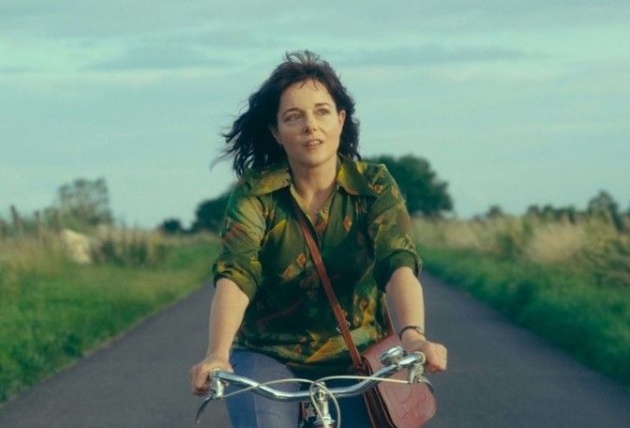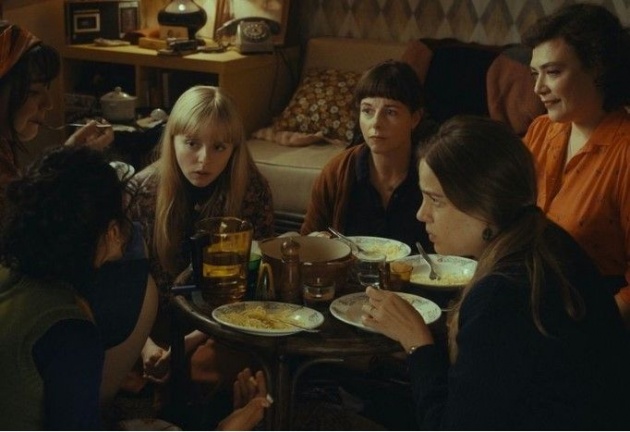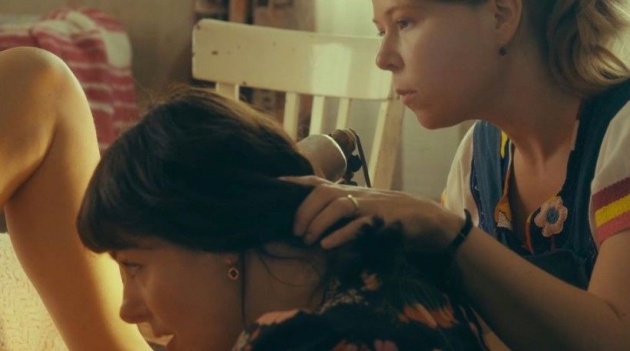
Pictured: Empowered and battling an anti-abortion law, housewife turned activist, Annie (Laure Calamy) in a scene from the 1970s set French drama, 'Annie Colère' ('Angry Annie'), directed by Blandine Lenoir from a screenplay by Lenoir and Axelle Ropert. Still courtesy of Aurore Films / Diaphana Distribution (France)
Watching the 1970s set French drama, Annie Colère (Angry Annie), I experienced a sense of déjà vu. In it, a thirty-something married mother of two procures an abortion, joins an illegal group, and starts performing abortions herself. Didn’t I watch this last week with Call Jane? Director Blandine Lenoir, who co-wrote the screenplay with Axelle Ropert, spent five years on the project, researching the work of MLAC – the Movement for the Liberation [Freedom] of Abortion and Contraception, which led to the legalisation of abortion in France in 1975. She has made the better film, only accidentally finding timeliness – as Call Jane did – with the overturning this year of Roe vs Wade in the United States, which once again criminalised the termination of pregnancies in large swathes of the country. Set in a small village, Lenoir’s film deals with a nervous mother, Annie (Laure Calamy) who seeks help from her local MLAC and, like the protagonist in Call Jane, finds herself joining a group of volunteers in a kind-hearted, humanist defiance of the law.
Lenoir’s film begins with Annie at work in a local mattress factory, manually sewing the tufts on blue and white striped mattresses. The rhythm of the work, which involves the smoothing of mattresses and a long needle passing through material, is transfixing. Disappointingly, this is the only scene on the factory floor, though the purpose of it is to show Annie’s deft manipulation. When we next see her, Annie is on her bicycle at night being honked by a car directly behind. There are a number of scenes of Annie on her bicycle, each one making me feel more nervous than the last. The mode of transport illustrates her vulnerability and relative lack of access to resources. Back in the 1970s, bicycles weren’t an environmentally friendly alternative to motorised vehicles, rather an affordable one. These days, bicycles are expensive, starting at £1,000.
Annie arrives at a bookshop and looks nervously around. A woman approaches her, recognising her anxiety. ‘If it’s a book, I can help you. If it’s the meeting, please step through the curtain.’ Annie wanders into another world, one without a coffee machine – later Annie will donate hers – where she joins two other women to tell her story, having been greeted by the kindly Hélène (Zita Hanrot). Annie explains that she has had an abortion before, but shudders at the memory. Now she has two children and cannot afford a third. Hélène is sympathetic. She explains the procedure. Annie and the other women will be checked by a practising doctor, who will prescribe drugs to be taken before the abortion. Annie will visit one of the women’s houses and the abortion will be performed there. There will be a relatively small amount of pain. The biggest surprise is that it is free. Some equipment is required and occasionally the group raise funds to send women to Holland or England. ‘I expected to pay,’ explains one woman. Hélène is happy to take her money. As Annie discovers, an abortion, when performed correctly (involving the dilation of the uterus), is far less painful than giving birth.
Unlike in Call Jane, the protagonist’s husband, Philippe (Yannick Choirat) is completely on board with an illegal abortion, beginning a conversation with, ‘well, did you see them?’ For the most part, kindly Doctor Chevals aside, the men in the drama are unhelpful, even those who volunteer to perform abortions. As in Call Jane, the argument is rehearsed as to whether individuals with no certified training can perform the procedure. ‘Women deliver babies,’ is the riposte. Annie’s route from pregnant woman to abortionist is conveyed in a logical and believable manner. In Call Jane, it is something of a leap.
The abortion itself is surprisingly bloodless. Annie lies down and, in order to distract her from the pain while the procedure takes place, another woman (Rosemary Standley) sings to her. The so-called Karman method could not be more supportive to the woman. Having used the service, Annie and other women are encouraged to join the MLAC group. Annie does so willingly.
There is, however, tragedy. Annie’s neighbour, the mother of a new-born but pregnant again, dies at the hands of a backstreet abortionist. You wonder why Annie didn’t tell her about the group but the incident cements her commitment to the MLAC group. She joins in with the induction and is surprised when a young woman says that she wants Annie with her during the procedure to provide reassurance. This incident is Annie’s gateway to learning how to perform the procedure itself.

Pictured: A meeting of an MLAC group (featuring, left to right, India Hair, Laure Calamy and Rosemary Standley) in the 1970s-set French film, 'Angry Annie' ('Annie Colère'), co-written and directed by Blandine Lenoir. Still courtesy of Aurore Films / Diaphana Distribution (France)
The group is under threat of arrest – at one point, they observe a male policeman outside their meeting place. However, there are so many women involved – 150 MLAC groups across the country – that ‘they’ [the police] wouldn’t dare. We learn that even the wife of a local judge had had an abortion. However, there are more women who require an abortion than there is the capacity to meet their request. As in Call Jane, the group has to choose.
Annie’s abortion experience makes her wonder about her teenage daughter. Is she taking steps to protect herself? The teenage girl, who would rather her mother would help her with her homework, takes offence at such conversation, though later she volunteers to form a ‘youth MLAC’ group. Annie’s young son struggles with mathematics; later Annie buys him a calculator.
Annie’s activism does eventually drive a wedge between her husband and herself. The family are all dressed up to attend a wedding when there is a knock on the door. One of the abortionists is unavailable; Annie is asked to help. She apologises that she cannot. The family car pulls away, then stops. Annie rushes out, having reconsidered. After she misses the wedding, Philippe decides to spend some time alone. They eventually separate. In another sub-plot, a woman is intimidated by her husband. She leaves him to stay with her cousin. Annie is entirely sympathetic.
Periodically, front pages of the newspaper, ‘Liberation’ are cut out and put on display. ‘At last, the Karman method is openly discussed,’ one woman declares. Lenoir shows a television chat show in which the actress Delphine Seyrig is shown in a separate studio defending a woman’s right to abortion, whilst a group of men in another studio discuss the topic. The contrast between the two sides couldn’t be starker. Seyrig was one of 343 women who signed a manifesto to publicly admit that they had had an abortion, risking imprisonment. This manifesto helped shift public opinion.
One of the women Annie sees has had six children. She doesn’t want a seventh as she confesses to feeling ‘so tired’. Performing abortions gives Annie a sense of purpose and of power. The legalisation of abortion is greeted as a mixed blessing. MLAC abortions are free while the state charges for their service, placing it out of reach of the poor. Moreover, Annie feels that now that she no longer has to perform illegal abortions, she has lost her power.
There are moments of comedy, such as Annie being loaned a well-thumbed book about the female body and Philippe later reading it in bed. With the aid of a mirror, she is also shown the ‘beautiful pink ball’ between her legs; Annie invites another woman to look at her sex.

Pictured: Annie, get your rod. Annie (Laure Calamy) and colleague (India Hair) in a scene from the 1970s-set French drama, 'Angry Annie' ('Annie Colère') written (with Axelle Ropert) and directed by Blandine Lenoir. Still courtesy of Aurore Films / Diaphana Distribution (France)
What it lacks in gripping drama, Angry Annie makes up for in celebrating compassion. The purpose of the film is to destigmatise abortion. Lenoir doesn’t posit the other point of view; religion and the argument about the sanctity of life isn’t mentioned. This is in line with the creation of positive alternative messaging, where you don’t give a platform for the argument that is destructive, rather focussing on a narrative that is empowering. There is an argument that if you provide balance in your messaging, then audiences hear the negative side twice; once from those spreading negative propaganda, the second from you. This validates the negative side more than the positive, since a message that is confirmed resonates more than one shown in isolation. If you only focus on the argument that you believe has the most validity, you assume viewers have been exposed to the alternative and are now ready for your counter argument. In the case of Angry Annie, you can take away the following: abortion isn’t murder and should not be thought of as such.
Reviewed at the Cine Lumiere, South Kensington, Central London, Thursday 10 November 2022, 19:00 screening, French Film Festival (UK)



